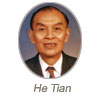AWARDEE OF TECHNOLOGICAL SCIENCES PRIZE
WANG BUXUAN
Abstract
Professor Wang Buxuan(B.-X. Wang), a scientist of engineering thermophysics and also, an educationist on thermal engineering, was born in Jiangsu (Province) in 1922. He received his B.S. degree from Tsinghua University in 1943 and his MS degree from Purdue University(U.S.A.)in 1949, both in Mechanical Engineering. He joined Beijing University since Jan. 1950. He returned to Tsinghua University in 1952, to head the Teaching & Research Group in Thermodynamics and Heat Transfer, and was appointed full Professor in Jan. 1961. In 1980, he was elected to be a Member (Academician) of the Chinese Academy of Sciences. Now, he still act as the Director of Research Institute for Thermal Science & Engineering in Tsinghua University, and the President of Chinese Society of Engineering Thermophysics.
Professor Wang has been an influential educator of thermal engineering in China. He established firstly a new speciality “Engineering Thermophysics” in Tsinghua University in 1957. Professor Wang was a founding member of the Chinese Society of Engineering Thermophysics. He was appointed by the State Education Commission as Chairman of the Committee for Basic Engineering Teaching on Thermodynamics & Heat Transfer in Colleges and Universities during 1979-1995, and as a leading member of the evolving section “Power Engineering & Engineering Thermophysics” of National Degree Committee from 1981-1997.
Professor Wang's research, a number of projects he undertook were prompted by national needs. For example, from 1963 to 1966, he led a research team seeking to accelerate the synthesis of ammonia in a large Sichuan chemical plant by enhancing heat transfer through a resign of compact heat exchanger within a tower so as to provide more effective catalystic volume and to obtain a more favorable temperature distribution in the piled catalyst. The efforts resulted in a doubling of the daily production, which is listed in the State Conncil's Government Bulletin of 1966 as one of the hundred important achievements.
Professor Wang's research activities covered a variaty of subjects, including heat transfer with/without phase change, heat and mass transfer in porous media, thermo- physical properties of matter, measuring techniques, biomedical heat transfer, energy planning and solar energy utilization. His basic research on the film boiling of subcooled liquid flowing with higher velocity along a solid surface and on the evaporation of liquid drops on solid surface from 1981 to 1987, won the National Natural Science Prize in 1989. His systematic creative research on the simultaneous heat and moisture transport in saturated and unsaturated porous media won the 1992 Progress in Science and Technology Prize from the State Education Commission. A new explanation of the classical leverett's capillary hystersis phenomena with a prostulated “minimum gradient” assumption, for which a method has been estiblished to determine experimentity.
Professor Wang has productively participated in international activities in the broad field of thermal science and technology since China opened her door to the world. He inaugurated the China Section of the International Solar Energy Society (ISES). He was elected a member of the Executive Committee of International Centre for Heat and Mass Transfer (ICHMT) in 1982 and again until 1987. He founded the Asian Thermophysical Properties Congress (ATPC) in 1984. He chaired International Conferances on Heat Transfer, on Transport Phenomena, and on Thermophysical Properties of Matter, during the past 15 years. He acts as an Editor of International J. Heat & Mass Transfer since 1983. In recognition of Professor Wang's professional accomplishments, he was given the “Research Scholarship Award” by the Japan Society for the Promotion of Science in 1985, and was awarded the “Energy for Mankind” Prize by Global Energy Society in California, USA, in June 1986.






